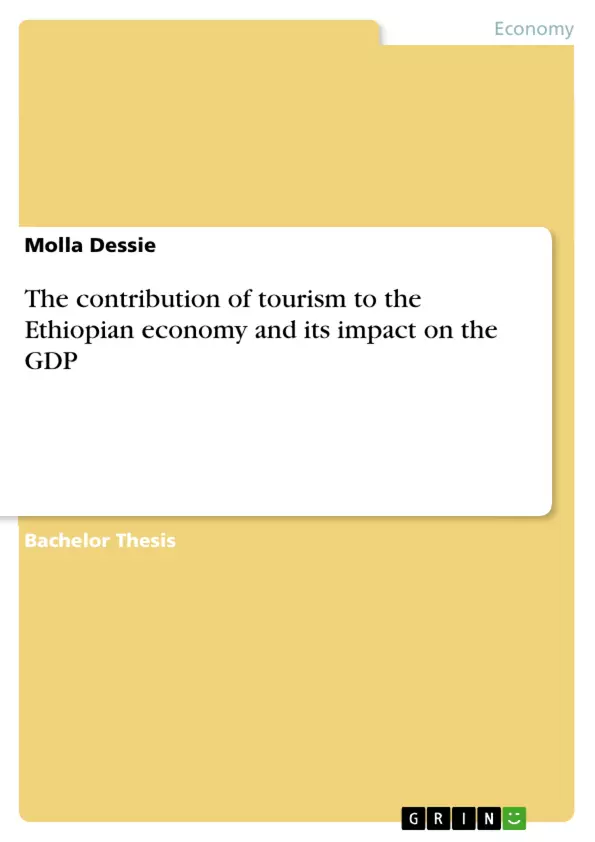The main objective of the study is to see overall contribution of tourism to the Ethiopian economy. Specifically: Tourism contribution to the GDP of the country, Tourism contribution to employment, Tourism contribution to foreign exchange generation, To examine the causal effect of tourism on economic growth.
Furthermore this research is to investigate the contribution of tourism for the Ethiopian economy over the year 2004-2014 for descriptive and 1991-2014 for econometrics. Graphs, table and, percent and Autoregressive Distributed Lag (ARDL) Approach to Co-integration and Error Correction Model are applied in order to investigate the long-run effect of tourism receipt on economic growth. Specifically this research assessed the impact of tourism on GDP, employment, foreign exchange earnings, and economic growth. The result shows tourism positive contribution to GDP, employment, foreign exchange earnings and stable relationship between tourism receipt and economic growth. The empirical result reveals that tourism receipt found to have positive impact on economic growth. So the government and citizens should strive to improve tourism industry and to generate more income especially foreign exchange.
According to WTO, tourism is a combination of activities travelling to and staying in places outside their usual environment for not more than one year for leisure, business and other activities. It is beyond the common perception of tourism as being limited to holiday activity. The WTO further explains that tourism refers to all activities of visitors including both tourist (overnight visitors) and same day visitors. This definition was adopted by UK government and WTO used it since 2004.
Tourism developed many years back when people travel from one place to another place for different purpose. Human beings have been active travelers for the purpose of hunting and gathering, herding animals in small groups that provided them with food, skin for cloth and bones for making different tools.
Inhaltsverzeichnis (Table of Contents)
- Acknowledgement
- Acronyms
- Abstract
- CHAPTER ONE
- Introduction
- Background
- Statement of the Problem
- Objective of the Study
- Significance of the Study
- Scope and Limitation
- CHAPTER TWO
- Literature Review
- Theoretical Literature
- Empirical Literature Review
- CHAPTER THREE
- Model Specification and Methodology
- Methods of data analysis
- CHAPTER FOUR
- Data Presentation and Analysis
- Descriptive analysis
- CHAPTER FIVE
- CONCLUSION AND POLICY IMPLICATION
- Conclusion
- Policy Implication
- REFERENCES
- Annex 1
- Annex 2
Zielsetzung und Themenschwerpunkte (Objectives and Key Themes)
This research aims to examine the contribution of tourism to the Ethiopian economy from 2004 to 2014, using descriptive and econometric analysis for the period 1991 to 2014. The study investigates the long-term impact of tourism revenue on economic growth. The research assesses the impact of tourism on various economic indicators, including GDP, employment, and foreign exchange earnings.
- The impact of tourism on the Ethiopian economy
- The long-run effect of tourism revenue on economic growth
- The contribution of tourism to GDP, employment, and foreign exchange earnings
- The relationship between tourism receipt and economic growth
- Policy implications for the Ethiopian tourism industry
Zusammenfassung der Kapitel (Chapter Summaries)
Chapter One introduces the research topic and provides background information on the Ethiopian tourism industry. It outlines the research problem, objectives, significance, and scope. Chapter Two reviews existing literature on tourism and its economic impacts, including theoretical and empirical studies. Chapter Three discusses the methodological framework, data analysis methods, and model specification used in the research. Chapter Four presents and analyzes the data, including descriptive statistics and econometric estimations.
Schlüsselwörter (Keywords)
Tourism, Ethiopian economy, economic growth, GDP, employment, foreign exchange earnings, tourism revenue, econometrics, Autoregressive Distributed Lag (ARDL) approach, co-integration, error correction model, policy implications.
- Quote paper
- Molla Dessie (Author), 2016, The contribution of tourism to the Ethiopian economy and its impact on the GDP, Munich, GRIN Verlag, https://www.grin.com/document/935430



